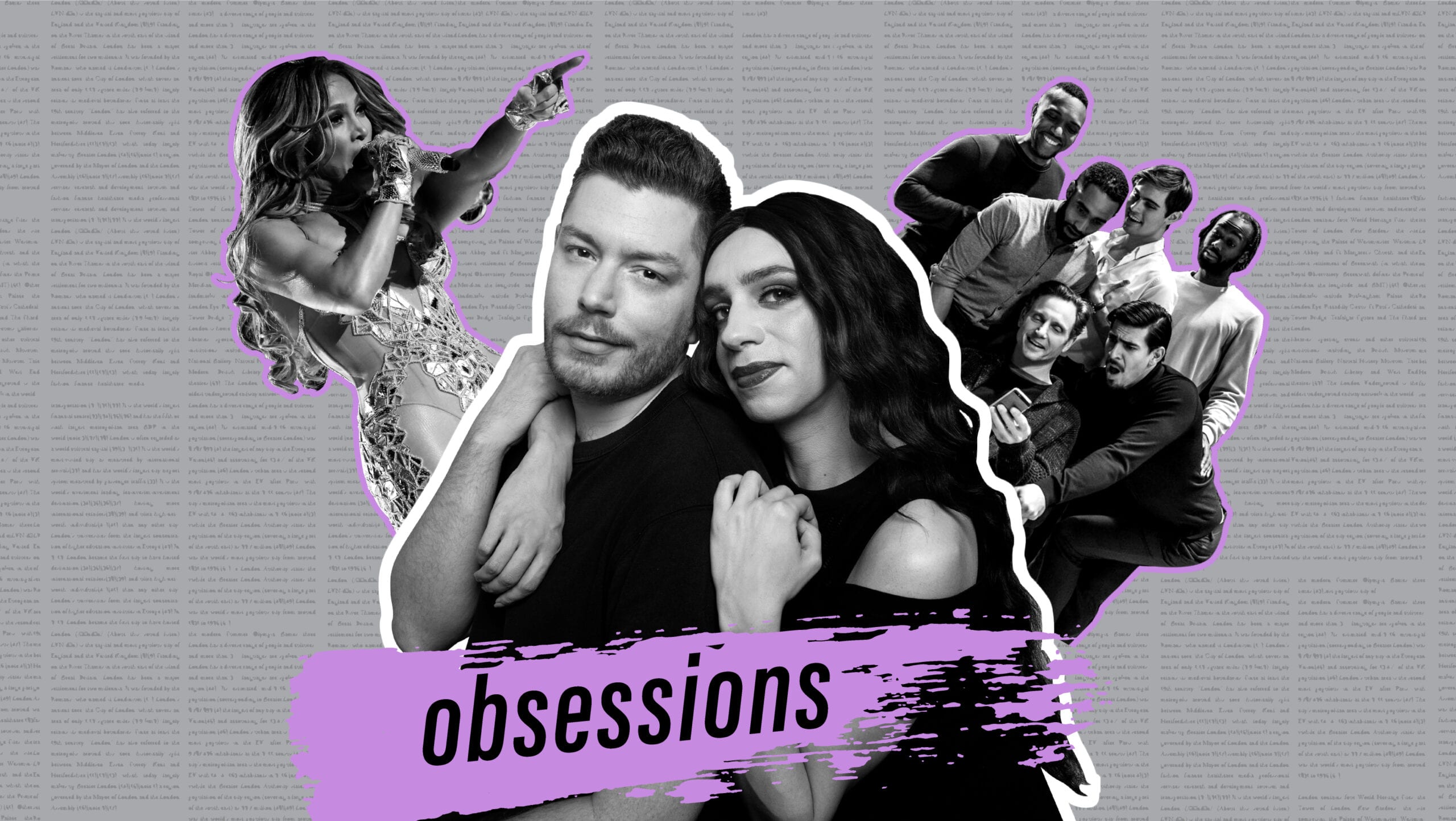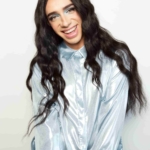Obsessions celebrates the pop culture fixations of queer, cosmically-destined BFFs Thomas Leblanc and Tranna Wintour, hosts of the CBC podcast Chosen Family.
I have loved and hated Jennifer Lopez since 1999. I watched her rise to stardom and fall into pop culture obscurity (see 2006 to 2010), then witnessed her rise again. I’ve seen every mediocre movie (The Wedding Planner and The Backup Plan are my favourites), and was dazzled by her brilliance in Hustlers. I’ve seen all the red carpet highs (like the unforgettable green Versace dress) and lows (her Monster-in-Law premiere sack). In short, I have witnessed Lopez become a bonafide legend.
Unlike the divas who came before, like Barbra Streisand, Judy Garland and Bette Midler, Lopez did not become a legend by virtue of talent but rather by sheer force of will. While she can certainly dance and put on a dazzling show, her acting is often wooden and her vocals aren’t much stronger than Victoria Beckham’s. How was she able to transcend her artistically limited oeuvre complet and reach the top of the A list?
Her tenacity is astounding: She’s one of show business’s greatest hustlers. And her game-changing moves started when she baptized herself “J.Lo.” That nickname became the title of her 2001 sophomore album, which is now being issued on vinyl for the first time by Vinyl Me, Please, a company that specializes in deluxe vinyl releases. Their slogan is “Every great album has a story.” But what’s J.Lo’s great story?
The album is peak millenium pop and takes me right back to middle school. “Love Don’t Cost a Thing” conjures memories of girls in my class wearing terry cloth Juicy Couture jumpsuits and low rise jeans, leaning forward in their seats so the guys behind them could see their thongs. That was all J.Lo’s influence (and Britney’s).
I love the album and the nostalgic joy it brings, especially the bold, bright hits “I’m Real” and “Ain’t it Funny,” and hidden gems “Walking on Sunshine” and “Dance With Me.” But I can’t lie—the album is not a masterpiece. Let me take inspiration from J.Lo and be real: this album is a guilty pleasure if there ever was one. Like all great mainstream pop from that time, it’s pretty soulless but so damn catchy.
For me, the great story of J.Lo is not the music, but the visuals. I’m buying the vinyl for the cover. That blinged-out “J.Lo” logo is the true masterpiece. Those three gold letters were all it took to establish Jennifer Lopez the enterprise; like RBC, IBM or NBC, J.Lo is a corporation.
Pop stars have been extending their brands for nearly two decades and by now, superstars’ beauty and fashion lines—like Rihanna’s Fenty Beauty empire—have become de rigueur; a lucrative side hustle in an era of music streaming and declining record sales. But J.Lo was one of the first pop stars to market herself as a brand, launching a clothing label (called “J.Lo,” of course) in 2001, followed a year later by her first perfume (Glow by J.Lo, which single-handedly revived the celebrity perfume industry). Lopez built her corp at the same time she was establishing her musical career, and maybe that’s why I (and maybe you, too), have always been skeptical of her true intentions as an artist. Is she really that “real”?
Lopez is, of course, one of the first true crossover Latinx superstars, and that is undeniably meaningful and important. She has recorded albums in Spanish and made powerful statements about Puerto Rican statehood and the brutal treatment of migrant children at the southern U.S. border at her recent Super Bowl performance. At the same time, she has repeatedly and blatantly appropriated looks and sounds from other cultures, most notably from Black culture (a quick Google search of “Jennifer Lopez + cultural appropriation” yields 391,000 results). She also stole vocals from Ashanti and presented them as her own.
Like Céline Dion and Britney Spears, Lopez is so monolithic that she’s essentially become a blank canvas upon which we can project any image we want—from the greatest entertainer of all-time to the untalented, problematic, cultural thief. It’s like the iconic J.Lo album cover itself: Is it the portrait of a fiery, determined artist in denim or one of a cold, calculating businesswoman in denim?
While I think all readings of La Lopez are valid, I, personally, sit comfortably in the middle—though totally, forever engaged. Twenty years later and she remains inescapable, dominating the cultural zeitgeist once again. Most shockingly of all? Between her Oscar-worthy (she was snubbed!) performance in Hustlers and her electrifying show at the Super Bowl, she’s proven that she actually does have—at least some—undeniably real talent.
— Tranna Wintour

From the moment I first read about Matthew Lopez’s new Broadway play The Inheritance, my fear of missing out kicked in (I cringe writing this, but these are facts). Good ol’ NYC FOMO usually emerges once a year, when I agree with Madonna that Canada is a little too boring.
After many acquaintances posted pictures of their Playbill program on Instagram, I made my way from Montreal to catch the gay theatre event of the year. The two-play, seven hour-long epic is a queer reimagining of E.M. Forster’s novel Howards End and it centers on Eric Glass (Kyle Soller), a New Yorker who inherits a rent-controlled apartment, where he hosts parties with his writer fiancé Toby Darling (Andrew Burnap). From the onset of the play, the all-male cast enacts a writing workshop and wonders aloud just how to tell a story. A gay story.
The Inheritance succeeds at packaging queer history for Broadway, throwing references to Stonewall, the AIDS crisis and Fire island. There is nudity, too, so the largely gay audience doesn’t end up feeling like they’ve spent their money on a TED Talk! And don’t forget the crying: director Stephen Daldry (The Hours, Billy Elliot, The Crown) ends the first part of the play in an Angels in America-style lacrimal apotheosis with dozens of dead young men introducing themselves to Eric as casualties of the epidemic. My friend Ted Kerr, an artist and activist, confided that he expected that scene to end with Kelly Clarkson’s What Doesn’t Kill You Makes You Stronger because it was so over the top.
I loved The Inheritance because it presents gay men of my generation with both idealism and contradictions. It shows that on some woke level, we are trying to be hyper-aware of those who came before and those who struggle today. But also, on an emotional level, the play points out that queer men who look like me (cis, white, able-bodied, born after 1980) don’t always understand what it means to survive a plague or systemic oppression.
I also hated The Inheritance because it pushes buttons by representing a very narrow version of 21st-century gay life. It was hyper-referential in a way that makes some New Yorkers clap (housing is expensive! Actors take the train to auditions!). The mostly male representation of the AIDS crisis, as well as a problematic portrayal of a sex worker as a victim, made me question if the show’s ethos is as progressive as it wants to be.
I thought it was hot at times, a mess at others. I’m not alone. I loved to hate it, and hated to love it. And that’s the point.
There has been a lot of talk about intergenerational dialogue in the gay community recently, especially since Netflix’s Tales of the City dinner party scene. Matthew Lopez doesn’t always succeed at bridging the gap between generations and groups within the LGBTQ2 community, but at least he tries. And even if the play left me cringing at times, its defiant ambition haunted me for weeks.
The way I felt about The Inheritance is how I feel about queerness in 2020: Conflicted. The way our identity is packaged in the play to make it palatable to a mainstream audience annoys me, but I loved seeing (some of) our stories represented. The show stayed with me because it dared to be imperfect, in a community that often expects perfection from all its creators.
— Thomas Leblanc



 Why you can trust Xtra
Why you can trust Xtra


